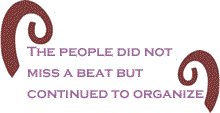The
breathtaking Arab democratic revolt has been moving at such
a pace that it is difficult to stop at any one juncture
and analyze what is unfolding. At the same time, simply
broadcasting the facts is not enough since, among other
things, the facts never speak for themselves: people speak
and, indeed, the facts can be interpreted in a number of
ways. With that in mind I want to offer a few observations
for your consideration.
 First,
it is worth repeating time and again that the revolt did
not appear out of nowhere. While it is absolutely the case
that few, if anyone, expected the revolt to erupt now, this
was not an uprising that appeared out of a vacuum. What
has been largely unreported, and in some cases (particularly
from Western sources) misreported, is the fact of the long-term
organizing that has been taking place in each of the countries
where these democratic movements have appeared. This organizing,
however, must be distinguished from nationally-coordinated
efforts. If you look at Egypt,
for instance, the Western media would lead you to believe
that the only opposition that faced ousted President Mubarak
was from the conservative Muslim Brotherhood. This is very
far from the truth. An independent labor union movement
has been operating beneath the surface of Egyptian society
for years. In the final days of the anti-Mubarak uprising,
the impact of their organizing could be seen in the strikes
that spread across Egypt. Yet, with the exception of noting the strikes,
little else was said. It is also worth mentioning that the
labor movement in Tunisia
also played a key role in the uprising in that country. First,
it is worth repeating time and again that the revolt did
not appear out of nowhere. While it is absolutely the case
that few, if anyone, expected the revolt to erupt now, this
was not an uprising that appeared out of a vacuum. What
has been largely unreported, and in some cases (particularly
from Western sources) misreported, is the fact of the long-term
organizing that has been taking place in each of the countries
where these democratic movements have appeared. This organizing,
however, must be distinguished from nationally-coordinated
efforts. If you look at Egypt,
for instance, the Western media would lead you to believe
that the only opposition that faced ousted President Mubarak
was from the conservative Muslim Brotherhood. This is very
far from the truth. An independent labor union movement
has been operating beneath the surface of Egyptian society
for years. In the final days of the anti-Mubarak uprising,
the impact of their organizing could be seen in the strikes
that spread across Egypt. Yet, with the exception of noting the strikes,
little else was said. It is also worth mentioning that the
labor movement in Tunisia
also played a key role in the uprising in that country.
By
way of summation, while these revolts, and especially the
Egyptian revolt, may be revolutions without leaders, we
should be clear that they are NOT revolutions without organization.
Whether one is talking about the Egyptian youth movement
(April 6th Movement), the unions, or for that matter Islamist
groupings, organization has been very much part of making
these revolts happen.
Second,
while the Internet has been essential, the revolt in Egypt demonstrated that action could progress
when it was shut down. The use of the Internet, particularly
social media, has made these revolts possible on the scale
that they have been operating. The ability for social forces
to follow developments in other countries and to quickly
learn certain lessons cannot be overstated. At the same
time, it is striking that when the Internet was shut down
in Egypt, the movement
continued to gather steam. The people did not miss a beat
but continued to organize. This should be a very important
lesson to us in the USA who have come
to rely on the Internet, often to the exclusion of face-to-face
organizing.

Third,
the USA remains at a
loss as to what to do. The Arab democratic revolt challenges
the rhetoric of the USA
in its fundamentals. At the beginning of the revolt in Egypt, the Obama administration was quite prepared
to assert the strength of Mubarak. Events quickly overtook
this stand. But now the USA
finds itself in the position of having to renegotiate its
relationship with the Arab World. The terms of such a renegotiation
remain unclear because the political character of the post-tyranny
regimes remains up in the air. It is quite possible that
non-authoritarian but nevertheless pro-Western regimes could
solidify, but other outcomes are also possible.
 A
final point. While it is correct to speak of an Arab democratic
revolt, in each country, there are specifics that observers
must better understand. Algeria
is not Egypt
and Egypt was not Tunisia
and none of them are Yemen.
While there were and are similarities, everything from the
demographics to the political forces differs dramatically.
While Tunisia,
and now Egypt,
have inspired the Arab World (and quite possibly inspired
the non-Arab World, such as Iran), the revolutions
cannot succeed based solely on inspiration. The questions
of organization, history of struggle, popular support and,
yes, cracks in the respective regimes will all be critical
in how, when and where events will unfold. A
final point. While it is correct to speak of an Arab democratic
revolt, in each country, there are specifics that observers
must better understand. Algeria
is not Egypt
and Egypt was not Tunisia
and none of them are Yemen.
While there were and are similarities, everything from the
demographics to the political forces differs dramatically.
While Tunisia,
and now Egypt,
have inspired the Arab World (and quite possibly inspired
the non-Arab World, such as Iran), the revolutions
cannot succeed based solely on inspiration. The questions
of organization, history of struggle, popular support and,
yes, cracks in the respective regimes will all be critical
in how, when and where events will unfold.
That
said�damn this is inspiring!
BlackCommentator.com Editorial Board member, Bill Fletcher, Jr., is a Senior Scholar with
the Institute for
Policy Studies, the immediate past president ofTransAfricaForum and co-author of, Solidarity Divided: The Crisis in Organized Labor and a New Path
toward Social Justice(University of California Press), which examines
the crisis of organized labor in the USA. Click here to contact Mr. Fletcher.

|

